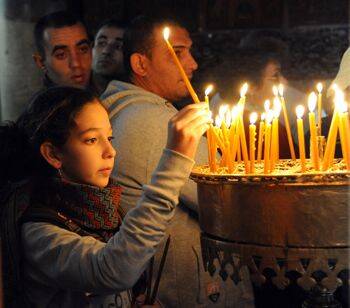UNESCO has placed sites—including the Church of the Nativity—in Bethlehem, West Bank, on its list of World Heritage in Danger. In a 13-6 vote with two abstentions, the World Heritage Committee added the sites to the danger list on June 29 during a meeting in St. Petersburg. In its application, Palestine, which became a full UNESCO member last October—said the church had not had upkeep and repairs since 1967, when Israel began occupation of the West Bank and because of Israeli restrictions on movement in and out of the territory. Inscribing a site on the List of World Heritage in Danger allows the World Heritage Committee to allocate immediate assistance from the World Heritage Fund to the endangered property. It also alerts the international community to situations in the hope that it can join efforts to save these endangered sites. The United States and Israel—who were not committee members—had opposed the move. Last fall, the custos of the Holy Land, Franciscan Father Pierbattista Pizzaballa, told the Italian bishops' news agency SIR the Franciscans were hoping the Church of the Nativity would not be included on a UNESCO list. He said he and other Christian leaders believed the initiative would make "it harder for us to run (the church), because, under UNESCO rules, the board in charge of running a place for the U.N. agency is the government, not the owner of a site." The Franciscans are the Catholic partner in maintaining the Status Quo, a 19th-century agreement that regulates jurisdiction of and access to key Christian sites—including the Church of the Nativity—in the Holy Land for Catholic, Orthodox and other Christian communities. A Franciscan source said that adding UNESCO to an already complex situation would only make it more complicated.
Church of Nativity Added to List of Endangered Heritage Sites
Show Comments (
)
Comments are automatically closed two weeks after an article's initial publication. See our comments policy for more.
The latest from america
Amidst the excavation of a former Irish mother-and-baby home, Catholic experts are urging journalists to carefully fact-check their reporting after many prior accounts of the issue have featured erroneous details.
July 16 marks 80 years since the first atomic bomb was detonated. The specter of nuclear annihilation has been with us ever since.
The first time we see the titular hero of James Gunn’s new film “Superman,” he doesn’t descend from the heavens. He plummets.
If we imagine ourselves as satisfying a God who will “give us” things only if we do the “right things,” then our relationship with God becomes less a friendship and more a chore.








